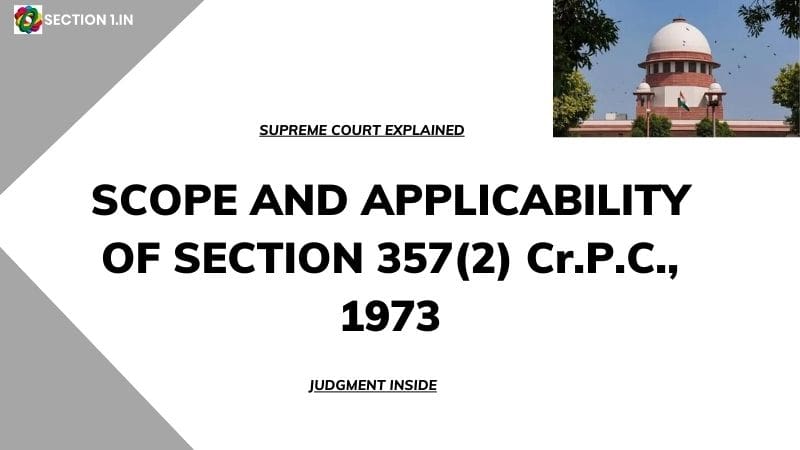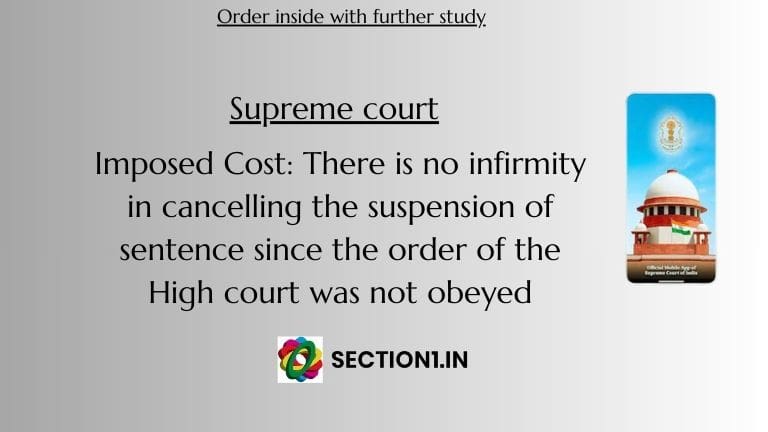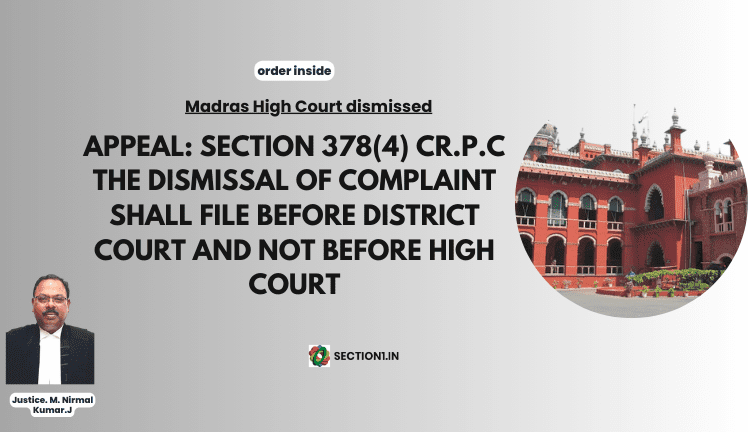1. This appeal has been filed against an order of the High Court of Jharkhand at Ranchi in Criminal Appeal NO.176 of 2018 by which High Court by allowing I.A.No. 892 of 2018 filed by the appellant, has directed to grant suspension of sentence of the appellant. The High Court further directed that the appellant should also deposit the fine amount awarded before the court below. The appellant is aggrieved only against that part of the order by which the High Court directed the deposit of fine amount.
XXX
4. The appellant aggrieved by the aforesaid direction of the High Court to deposit the fine amount awarded by the court below has come up in this appeal.
QUESTION OF LAW INVOLVED
10. We have considered the submissions of the learned counsel for the parties and perused the records. From the facts brought on record, it is clear that the sentence awarded to the appellant was a sentence of R.I. of five years with payment of fine of Rs.25,000/- and in default S.I. of three months. The said sentence was recorded in four cases and all sentences were to run concurrently. Thus, the fine was part of the sentence. The question which is to be answered in the present case is as to whether by virtue of Section 357(2) Cr.P.C., the said fine which was part of sentence automatically was stayed till the decision of the appeal and would not have been directed by the High Court to be deposited by the appellant.
11. For answering the question we need to reflect upon the statutory scheme as delineated by Section 357(2) Cr.P.C. Section 357(2) Cr.P.C. is part of Chapter XXVII- “THE JUDGMENT” of the Criminal Procedure Code, 1973. Section 353 deals about the judgment, its pronouncement, signatures, delivery and other aspects. Section 354 deals with language and contents of judgment. Section 355 refers to Metropolitan Magistrate’s judgment. Section 356 deals with order for notifying address of previously convicted offender and then Section 357 bears heading “Order to pay compensation”. Order to pay compensation, thus, is a part of judgment where Court directs payment for compensation.
12. Section 357(1) Cr.P.C. contemplates that when a Court imposes a sentence of fine or a sentence of which fine forms a part, the Court may, while passing judgment, order the whole or any part of the fine recovered to be applied. Section 357 is to the following effect:-
“………………………………..”
13. All the circumstances in sub-section (1) of Section 357 refer to direction to pay compensation out of the fine imposed. Thus, all the circumstances are circumstances where fine imposed and recovered is to be applied in the above circumstances.
THE TERM “NO SUCH PAYMENT SHALL BE MADE”
14. The fine is thus contemplated to be utilised for compensating different circumstances as enumerated in Section 357(1) Cr.P.C. Sub- Section (2) of Section 357 Cr.P.C. has been engrafted in reference to what was stated in sub-Section (1) of Section 357 Cr.P.C. Crucial words used in sub-Section (2) of Section 357 Cr.P.C. are “no such payment shall be made before the period allowed for presenting the appeal has elapsed, or if an appeal be presented, before the decision of the appeal”. Thus, what is prohibited under Section 357(2) Cr.P.C. is that payment of compensation utilising the fine be not paid till the period allowed for presenting the appeal has elapsed, or if an appeal is filed then before the decision of the appeal. It does not involve any concept of stay of sentence.
15. Chapter XXIX deals with the appeals. In the said Chapter Section 389 deals with the subject “suspension of sentence pending the appeal; release of appellant on bail”. Section 389(1) Cr.P.C. empowers the Appellate Court to order that the execution of the sentence or order appealed against be suspended and, also, if he is in confinement, that he be released on bail. Thus, the power of suspension of sentence emanates from Section 389 Cr.P.C. where Appellate Court is empowered to pass such an order. Sections 357 and 389 Cr.P.C. operate in two different fields. Section 357 Cr.P.C. contains an embargo that on passing a judgment of sentence of fine, the fine be not utilised for payment of compensation till contingency as mentioned therein does not occur. The sentence awarded by the Court including sentence of fine is in no way affected by embargo contained in Section 357(2) Cr.P.C. The operation of Section 357(2) Cr.P.C. is restricted to payment of compensation as contemplated by Section 357(1) and (3) Cr.P.C. The heading of the Section 357 Cr.P.C. i.e. “Order to pay compensation” as well as contents of the Section lead to only one conclusion that the entire provision has been engrafted regarding payment of compensation out of the fine imposed or when Court imposes sentence the fine is not part of which, the Court may by way of compensation direct payment of such amount to a person who has suffered the injury. We, thus, are of the view that Section 357 Cr.P.C. has nothing to do with suspension of sentence awarded by the trial court and the sentence of fine imposed on the accused is in no way affected by Section 357(2) Cr.P.C. The present is not a case where trial court has directed payment of any compensation to anyone out of fine imposed. There is no direction for payment of compensation in the order of the trial court nor present case is covered by the circumstances mentioned in sub-clauses (a) to (d) of Section 357(1) Cr.P.C. Present is also not a case of Section 357(3) Cr.P.C. Hence, there is no question of applicability of Section 357(2) Cr.P.C. The heading of Section 357 Cr. P.C throws considerable light in finding the object and purpose of the Section. Section 357 Cr.P.C. is only attracted when Court orders for payment of compensation. Section 357 is not attracted in any other case. It is well settled that heading of the Section plays a role when there is any doubt in interpretation of the Section. This Court in Bhinka and others vs. Charan Singh, AIR 1959 SC 960, while examining the role of a heading of section while interpreting a section noticed the following principle:
“…………………………..”
xxx
18. An appeal was preferred against the conviction order. The Appellate Court while admitting the appeal directed the accused to deposit a sum of Rs.5 lakh each within four weeks from the said date. Writ petition was filed questioning the legality of the said order of the Appellate Court which was dismissed and thereafter the matter was taken to this Court. A submission was raised before this Court that having regard to the provisions of Section 357(2) of the Code, the impugned judgment is wholly unsustainable inasmuch as in terms thereof the amount of fine imposed would automatically be suspended. 19. In the above case this Court considered sub-Sections (1), (2) and (3) of Section 357 of the Code and observed that sub-Section (2) shall be applicable both in regard to compensation as well as direction under sub-Section (3). In paragraphs 43, 44 and 45 following has been laid down:
“43. It does not appeal to us that although a compensation payable out of the quantum of fine would remain stayed under sub-section (2) of Section 357 of the Code, if a compensation is directed to be paid under sub-section (3) thereof, the same would not attract the said provision. (See P. Suresh Kumar v. R. Shankar, [(2007) 4 SCC 752])
44. Magistrates cannot award compensation in addition to fine. When a fine is imposed, however, the private party has no right to insist that compensation may be awarded to him out of the amount of fine. The power to award compensation under Section 357(3) is not an ancillary power. It is an additional power. (See Balraj v. State of U.P., [(1994) 4 SCC 29])
45. Clause (b) of sub-section (1) of Section 357 and subsection (1) of Section 357 and sub-section (3) of Section 357 seek to achieve the same purpose. What is necessary is to find out the intention of the lawmaker and the object sought to be achieved. Sub-section (2) of Section 357 uses the word “fine”. It does not say that what would be stayed i.e. application of fine. Sub-section (2) of Section 357, in our opinion, does not contemplate any other interpretation. Even assuming that Mr Lalit was correct in his submission, still then sub-section (3) would be squarely attracted.”
OBJECT OF SUSPENSION OF SENTENCE
20. Referring to Section 389 Cr. P.C., this Court noticed that suspension of a sentence and enlarging an appellant on bail, who is convicted and realisation of fine has been dealt with by Parliament under different provisions of the Code. In paragraph 51 following has been laid down:
“51. Section 389 does not deal with exactly a similar situation. Section 389 of the Code is to be read with Section 387 thereof. Suspension of a sentence and enlarging an appellant on bail, who is convicted and realisation of fine has been dealt with by Parliament under different provisions of the Code. The power of the court, thus, to suspend a sentence in regard to realisation of compensation may be different from that of a direction in realisation of fine.”
DISTINGUISING THE EARLIER SUPREME COURT JUDGMENT
23. This Court, in the above case, was dealing with the question of payment of compensation which was awarded by the Court under sub-Section (3) of Section 357 Cr.P.C. The Court was not dealing with fine which was part of the sentence. The Court, thus, had no occasion to consider the issue which has arisen in the present case. We, in the present case, are not concerned with payment of any compensation or applicability of Section 357(2) Cr.P.C. with regard to payment of any such compensation.
24. We also need to notice the judgment of this Court in Stanny Felix Pinto (supra). In the above case along with sentence of imprisonment, fine was also imposed under Section 138 of the Negotiable Instruments Act. The High Court while entertaining the revision granted suspension of the sentence by imposing a condition that part of the fine shall be remitted in court within a specified time which direction was challenged in this Court. This Court upheld the said direction. Following was held in paragraph 2:
“2. When a person was convicted under Section 138 of the Negotiable Instruments Act and sentenced to imprisonment and fine he moved the superior court for suspension of the sentence. The High Court while entertaining his revision granted suspension of the sentence by imposing a condition that part of the fine shall be remitted in court within a specified time. It is against the said direction that this petition has been filed. In our view the High Court has done it correctly and in the interest of justice. We feel that while suspending the sentence for the offence under Section 138 of the Negotiable Instruments Act it is advisable that the court imposes a condition that the fine part is remitted within a certain period. If the fine amount is heavy, the court can direct at least a portion thereof to be remitted as the convicted person wants the sentence to be suspended during the pendency of the appeal. In this case the grievance of the appellant is that he is required by the High Court to remit a huge amount of rupees four lakhs as a condition to suspend the sentence. When considering the total amount of fine imposed by the trial court (twenty lakhs of rupees) there is nothing unjust or unconscionable in imposing such a condition. Hence, there is no need to interfere with the impugned order. As such no notice need be issued to the respondent. Appeal is accordingly dismissed.”
25. It is true that this Court while deciding the said case did not consider Section 357(2) Cr.P.C. Learned counsel for the appellant is right in his submission that the above judgment cannot be held to be laying down any ratio on applicability of Section 357(2) Cr.P.C.
xxx
30. From the facts noticed by the High Court it is not clear as to whether the amount of fine Rs.20,000/- was directed to be paid to the victim. No such facts have been noticed in the judgment. If there was no direction to pay any compensation out of the fine imposed the facts of the said case are similar to the case in hand. We have taken the view that if there is no direction to pay any compensation out of fine imposed, Section 357(2) Cr.P.C. is not attracted. We are of the view that the High Court’s observation that in view of Section 357 sub-section (2) of Cr.P.C. the realisation of fine would automatically get stayed does not take into consideration the distinction in a case where fine is part of sentence and there is direction to pay compensation and in a case where there is no direction to pay any compensation.
32. The object and purpose of Section 357 Cr.P.C. was considered by this Court in Hari Singh vs. Sukhbir Singh and others, (1988) 4 SCC 551. This Court held that the power given to the Court to direct for payment of compensation is intended to do something for the victim. The provision was held to be a step forward in our criminal justice system. Following were the observations made in paragraph 10:
“10…It empowers the court to award compensation to victims while passing judgment of convict ion. In addition to conviction, the court may order the accused to pay some amount by way of compensation to victim who has suffered by the action of accused. It may be noted that this power of courts to award compensation is not ancillary to other sentences but it is in addition thereto. This power was intended to do something to reassure the victim that he or she is not forgotten in the criminal justice system. It is a measure of responding appropriately to crime as well of reconciling the victim with the offender. It is, to some extent, a constructive approach to crimes. It is indeed a step forward in our criminal justice system. We, therefore, recommend to all courts to exercise this power liberally so as to meet the ends of justice in a better way.”
33. What is the purpose and object of sub-Section (2) of section 357 Cr.P.C.? Section 357(1) Cr.P.C. contemplated utilisation of fine imposed in certain circumstances as compensation to be paid to victim. Sub-section (2) engrafted an embargo that such payment shall not be made till the period allowed for appeal has elapsed or if the appeal is filed, till the same is decided. Legislature was conscious that compensation paid if utilised, there may not be appropriate measures to recover the said amount utilised from victim to whom the compensation is paid hence embargo in payment has been engrafted in sub-section (2). Thus at best sub-section (2) of Section 357 Cr.P.C. is a provision which differs or withholds the utilisation of the amount of compensation awarded till the limitation of appeal elapses or if filed till it is decided. The provision in no manner stays the sentence of fine during the pendency of the appeal. The purpose for which sub-section (2) of Section 357 Cr.P.C. has been enacted is different as noted above and it never contemplates as stay of sentence of fine imposed on accused.
34. We, however, make it clear that Appellate Court while exercising power under Section 389 Cr.P.C. can suspend the sentence of imprisonment as well as of fine without any condition or with conditions. There are no fetters on the power of the Appellate Court while exercising jurisdiction under Section 389 Cr.P.C.. The Appellate Court could have suspended the sentence and fine both or could have directed for deposit of fine or part of fine.
37. In view of the foregoing discussion, we are of the view that Section 357(2) Cr.P.C. was not attracted in the present case since there was no direction of payment of any compensation out of the fine imposed by the trial court as part of sentence. Section 357 Cr.P.C.(2) comes into play only where any order of payment of compensation utilising the fine imposed as sentence under Section 357(1) Cr.P.C. or compensation as directed under Section 357(3) Cr.P.C. is made. Present being neither a case of Section 357(1) Cr.P.C. nor Section 357(3), sub-section (2) of Section 357 Cr.P.C. is clearly not applicable and the submissions raised by the learned counsel for the appellant are without any substance. We, thus, do not find any infirmity in the impugned order of the High Court where the High Court has directed the appellant to deposit the fine awarded by the trial court. In the result, the appeal is dismissed.
PARTY: SATYENDRA KUMAR MEHRA @ SATENDERA KUMAR MEHRA v. THE STATE OF JHARKHAND – Criminal Appeal No. 406 of 2018 – MARCH 23, 2018 – [2018] 4 S.C.R. 1033
https://main.sci.gov.in/supremecourt/2018/7750/7750_2018_Judgement_23-Mar-2018.pdf
Satyendra Kumar Mehra @ Satendera Kumar vs. The State of Jharkhand






